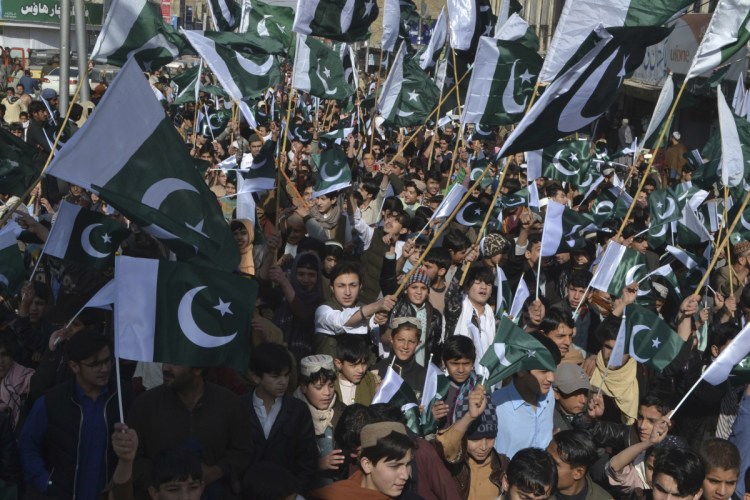NEW DELHI – Pakistani Prime Minister Imran Khan told parliament Thursday that his country will shortly release an Indian pilot it captured the day before, calling it a “peace gesture” after Pakistan and India engaged in their first aerial combat in nearly 50 years.
The pilot’s release will take place March 1, Khan said, and the move is likely to de-escalate the current hostilities between the two nuclear-armed neighbors.
The announcement comes just hours after President Donald Trump said that he had “reasonably attractive news” that tensions between India and Pakistan were set to lessen.
The United States and other countries called upon India and Pakistan to cease military action after two days of tit-for-tat airstrikes where both claimed to have shot down the other’s fighter jets and Pakistan captured an Indian pilot.
“We’ve been involved in trying to have them stop,” Trump told reporters in Hanoi. “We’ve been in the middle trying to help both out to see if we can get some organization and peace, and I think probably that’s going to be happening.”
Khan told lawmakers, who cheered his announcement, that “Pakistan’s desire for de-escalation should not be confused for weakness.” He accused India of rushing to blame Pakistan for a Feb. 14 militant attack in Kashmir that sparked the whole confrontation and of promoting “war hysteria.”
Indian Prime Minister Narendra Modi has not yet commented on the impending release of the pilot. He also remained silent after the situation escalated on Wednesday, spurring speculation that India could be preparing further military action.
Earlier on Thursday, Modi addressed his party’s workers and referred to unnamed “enemies” who are trying to destabilize and attack the country. “India will grow as one,” he said, speaking in English, a rare occurrence. “India will fight as one. India will win as one.”
Modi is running for reelection later in the spring and has staked his reputation on a muscular approach to national security. On Tuesday, India launched an airstrike within Pakistan, hitting what it said was a training camp used by Jaish-e-Muhammad, the terrorist group responsible for a Feb. 14 attack that killed 40 Indian paramilitary officers.
The next day, Pakistan swiftly responded with airstrikes across the unofficial border that divides the Himalayan region of Kashmir. In the ensuing dogfight, one Indian aircraft was shot down and its pilot captured. India said its fighter jets also brought down a Pakistani plane.
Indian government officials, speaking on condition of anonymity, said their main priority was to see Pakistan take steps against militant groups like Jaish-e-Muhammad. The spokesman for Pakistan’s Foreign Ministry, Muhammad Faisal, confirmed that it had received a file from India containing details on the Feb. 14 attack. “Action will be taken on any actionable intelligence, if found in the dossier,” he said.
For Modi, the pilot’s release will be a welcome step. When India first conducted its airstrikes on Tuesday, the country’s politicians – including Modi’s opponents – praised the move. Newspaper headlines in India reflected a sense of righteous revenge.
But after Pakistan’s response on Wednesday, however, the mood in India began to shift. The capture of the pilot, identified by Indian media as Abhinandan Varthaman, added a volatile element to an already dangerous situation. Modi’s opponents seized on his decision to continue election-related activities in the midst of the crisis and criticized him for saying nothing about the pilot’s capture.
“It’s been nearly 24 hours since our pilot has gone missing,” wrote Akhilesh Yadav, the leader of the regional Samajwadi Party and a Modi foe, on Twitter Thursday morning. “We’re all waiting with bated breath but not a word from our leadership. The silence is deafening.”
Send questions/comments to the editors.



Success. Please wait for the page to reload. If the page does not reload within 5 seconds, please refresh the page.
Enter your email and password to access comments.
Hi, to comment on stories you must . This profile is in addition to your subscription and website login.
Already have a commenting profile? .
Invalid username/password.
Please check your email to confirm and complete your registration.
Only subscribers are eligible to post comments. Please subscribe or login first for digital access. Here’s why.
Use the form below to reset your password. When you've submitted your account email, we will send an email with a reset code.